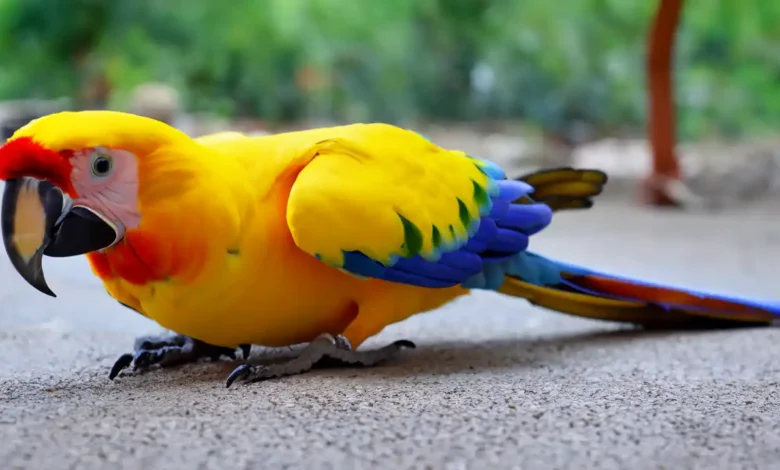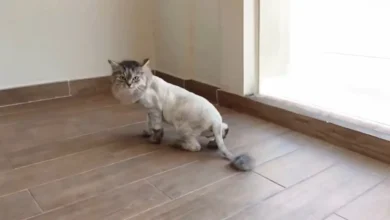Understanding Ataxia in Birds: Diagnosis and Treatment for Perch Weakness

Birds, like any living creatures, can experience health issues, one of which is ataxia in Birds, a condition characterized by a lack of coordination in movements. Ataxia in birds can stem from various underlying causes such as infections, trauma, poisoning, nutritional deficiencies, or neurological issues. Addressing this condition requires a systematic approach and specialized care tailored to the specific cause.
Identifying Avian Ataxia and Bird Coordination Issues
Recognizing signs of bird ataxia in your feathered companion is crucial. Birds suffering from ataxia may exhibit symptoms like unsteadiness, difficulty perching or walking, loss of balance, or irregular movements. Once these signs are noticed, it’s imperative to seek immediate veterinary care.
Steps to Address Treating Bird Ataxia and Bird Movement Disorders
- Veterinary Consultation The initial step upon noticing signs of avian ataxia in your bird is to consult a qualified avian veterinarian. A thorough examination will be conducted to determine the underlying cause.
- Diagnostic Tests The vet might perform various diagnostic tests such as blood tests, X-rays, CT scans, or MRIs to accurately diagnose the condition causing bird ataxia.
- Treatment of Underlying Cause
- Infections: Antibiotics or antifungal medications may be prescribed based on the specific infection.
- Trauma: Providing supportive care, managing pain, and following the vet’s guidance for care are crucial in cases of trauma.
- Poisoning: Treatment varies depending on the toxin ingested, sometimes requiring vomiting induction or antidote administration.
- Nutritional deficiencies: Adjusting the bird’s diet under veterinary guidance ensures it receives essential nutrients necessary for recovery.
- Neurological issues: Specific medications or therapies prescribed by the vet might be necessary to manage underlying avian neurological conditions.
- Supportive Care for Bird Health Disorders Facilitating your bird’s recovery involves providing a stress-free environment, ensuring optimal nutrition, maintaining warmth, and proper hydration.
- Follow-Up Care for Bird Balance Problems Adhering diligently to the vet’s instructions is crucial. This includes administering prescribed medications, maintaining a suitable environment, and attending follow-up appointments.
- Physical Therapy for Ataxia Causes in Birds In certain cases, physical therapy exercises outlined by a vet or avian specialist might aid the bird in regaining coordination and strength.
- Preventive Measures and Avian Veterinary Care for Ataxia Implementing preventive measures is crucial to avoid a recurrence. This involves keeping the bird’s environment clean, ensuring a balanced diet, and averting access to toxins or hazardous objects.
Understanding that successful treatment for avian ataxia hinges on identifying and addressing the root cause emphasizes the significance of consulting a qualified avian veterinarian. Their expertise ensures the best possible avian veterinary care for ataxia and support for your bird throughout its recovery journey.
FAQ’s
What is ataxia in birds?
Ataxia in birds refers to a lack of coordination in movements, leading to unsteadiness, difficulty in perching, walking, or flying. It can result from various underlying causes such as infections, trauma, poisoning, nutritional deficiencies, or neurological issues.
What are the common signs of ataxia in birds?
Common signs of ataxia in birds include unsteady movements, loss of balance, difficulty in coordinating movements, irregular or jerky motions, and challenges in perching or walking.
What should I do if I notice signs of ataxia in my bird?
Immediate veterinary consultation is crucial upon noticing signs of ataxia. Contact a qualified avian veterinarian for a thorough examination and diagnosis of the underlying cause.
How is ataxia diagnosed in birds?
Diagnosis often involves a comprehensive examination by a vet along with diagnostic tests such as blood tests, X-rays, CT scans, or MRIs to identify the specific underlying condition causing ataxia.
What treatments are available for ataxia in birds?
Treatment varies based on the underlying cause:
Infections: Antibiotics or antifungal medications may be prescribed.
Trauma: Supportive care and pain management are essential.
Poisoning: Treatment depends on the toxin ingested; sometimes antidotes or induced vomiting might be necessary.
Nutritional deficiencies: Adjusting the bird’s diet under veterinary guidance.
Neurological issues: Specific medications or therapies may be prescribed to manage these conditions.
Can ataxia in birds be prevented?
Prevention involves maintaining a clean environment, providing a balanced diet, and preventing access to toxins or hazardous objects. Regular veterinary check-ups and prompt treatment of any health issues can also contribute to prevention.
What supportive care can I provide to my bird with ataxia?
Supportive care includes creating a stress-free environment, ensuring proper nutrition, maintaining warmth, and ensuring adequate hydration for the bird’s comfort and recovery.
Is ataxia in birds curable?
The prognosis depends on the underlying cause. Prompt veterinary care and appropriate treatment can significantly improve a bird’s chances of recovery. However, some conditions causing ataxia may require long-term management rather than complete cure.
How long does it take for a bird to recover from ataxia?
Recovery time varies based on the cause and severity of ataxia. Some birds may show improvement quickly, while others might require more time and ongoing care for recovery.
Where can I find a qualified avian veterinarian?
You can locate a qualified avian veterinarian through local directories, recommendations from other bird owners, or online resources provided by professional veterinary associations or directories.




